MercoPress. South Atlantic News Agency
Tag: Luis Lacalle Pou
-
Tuesday, March 10th 2020 - 08:13 UTC
Donald Trump talks to Uruguayan president Lacalle Pou
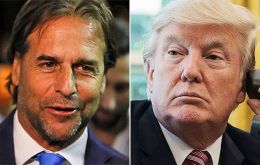
Uruguayan president Luis Lacalle Pou had his first contact with US President Donald Trump last Saturday, reported White House, special advisor, Judd Deere in a tweet.
-
Tuesday, March 3rd 2020 - 08:57 UTC
Uruguay: Interreligious prayer with Lacalle Pou on his first day as president
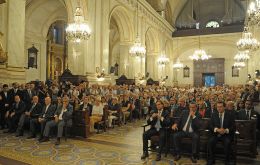
Surrounded by security and stopped by some parishioners who asked for a photo, the new president of Uruguay, Luis Lacalle Pou and part of his cabinet walked this Monday in the middle aisle of Montevideo’s Cathedral, to an interfaith ceremony held to pray for the new government.
-
Monday, March 2nd 2020 - 10:06 UTC
Government rotation in democratic Uruguay: business as usual

It was a March sunny Sunday in Montevideo, and for the solid democracy of Uruguay, business as usual. An outgoing center government was replaced by a center-right coalition that emerged victorious from the runoff last November. Despite fifteen years in office, three mandates, Luis Lacalle Pou, 46, is the new president for the next five years and for the first time with a woman vice president, notary Beatriz Argimón.
-
Monday, March 2nd 2020 - 07:58 UTC
New Uruguayan president promises to crack down on crime and promote a true fiscal rule
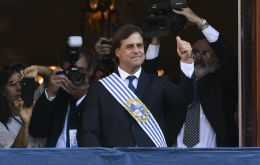
A center right president took office in Uruguay on Sunday, promising to crack down on crime and tighten government finances after a 15-year string of left-leaning governments. Luis Lacalle Pou, a 46-year-old surfing enthusiast and son of a former president, narrowly won the election in November, 37.000 votes, in his second try for the top office.
-
Monday, March 2nd 2020 - 06:50 UTC
Foreign Office official visits Argentina to address a long agenda including Falklands

Wendy Morton, the foreign office minister of European Neighborhood and the Americas arrives this Monday to Buenos Aires to meet with members of the Kirchner government, who over the weekend announced a new more demanding and aggressive Argentine policy referred to the Falklands and South Atlantic Islands sovereignty claim.
-
Thursday, February 27th 2020 - 09:20 UTC
Argentine president Fernandez announces meeting with his Uruguayan peer Lacalle Pou
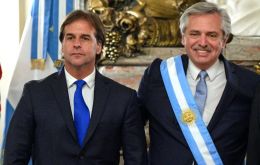
Argentine president Alberto Fernandez held a very positive phone conversation on Wednesday with Uruguayan president-elect Luis Lacalle Pou during which they analyzed the bilateral relation and the regional integration agenda.
-
Friday, February 21st 2020 - 08:40 UTC
Argentina pressing Uruguay on Falklands' RAF flights landing in Carrasco

Argentina is again putting pressure on Uruguay, this time on the incoming government which takes office next March first, insisting no UK military aircraft linked to the Falkland Islands be allowed to land in the country's airports and Falklands should not be treated as state with which Uruguay has extensive trade and business exchanges.
-
Tuesday, February 18th 2020 - 06:25 UTC
Bolsonaro insists in a good relation with Argentina, and insists in meeting with Alberto Fernandez
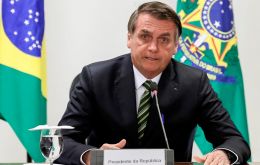
Brazilian president Jair Bolsonaro said on Monday he wants a “good relationship” with Argentina and it is up to the foreign ministers of both countries to agree on a meeting with his peer Alberto Fernandez, since the announced summit scheduled for March first in Montevideo, had fallen through.
-
Monday, February 17th 2020 - 09:05 UTC
Elected members of Uruguay's new Legislative branch take the oath of office
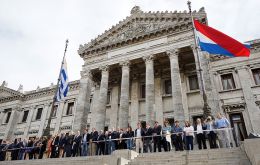
Uruguay's new Senators and Deputies which emerged from the general election results of last October were sworn in on Saturday during a ceremony held at the Legislative Palace. The ceremony not only confirmed 99 members of the Lower House and 30 Senators but also marked the opening of ordinary sessions of the XLIX legislative period.
-
Monday, February 17th 2020 - 08:54 UTC
Incoming Uruguayan foreign minister invited by Argentina's Felipe Solá

This Tuesday the incoming Uruguayan foreign minister Ernesto Talvi will be in Buenos Aires on an invitation from his future peer Felipe Solá, which has been interpreted as the first formal contact between the Kirchnerite government of Alberto Fernandez and that of president-elect Luis Lacalle Pou, who takes office on March first.
